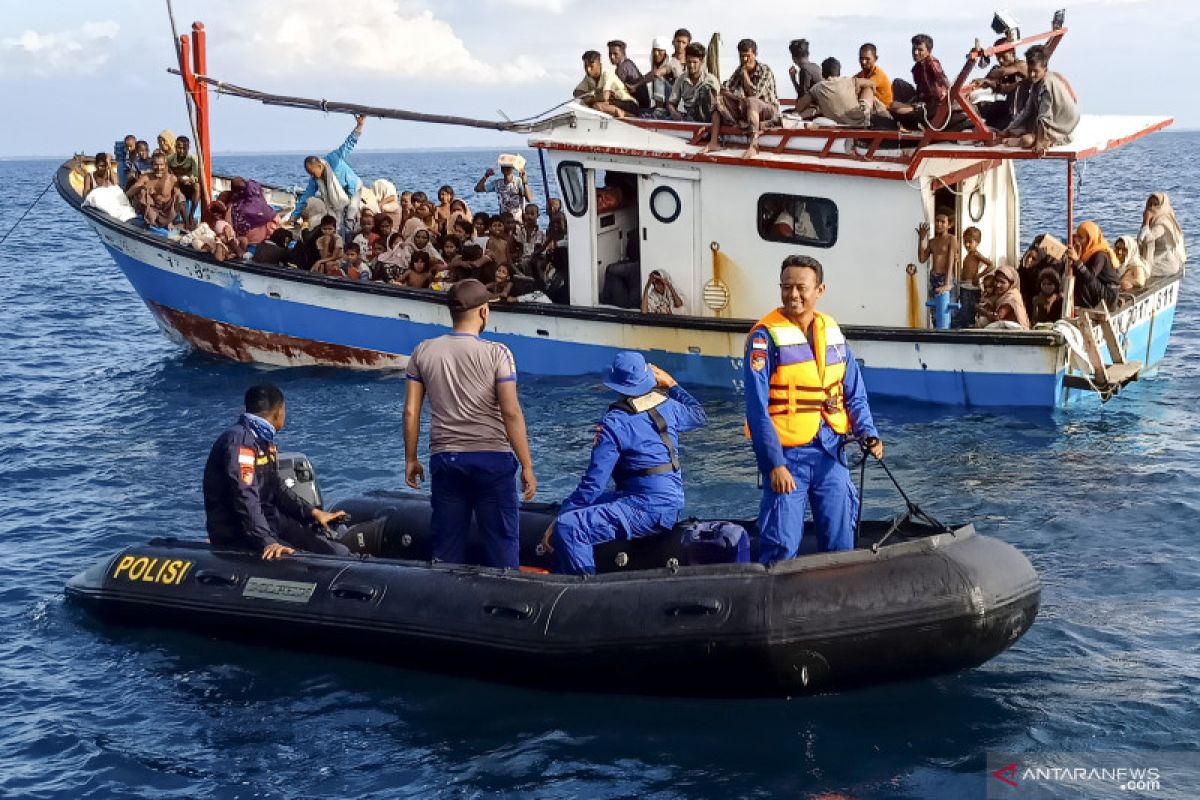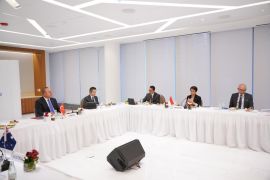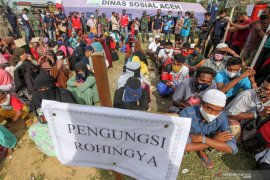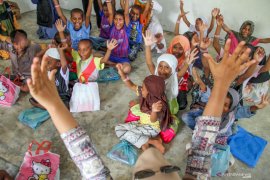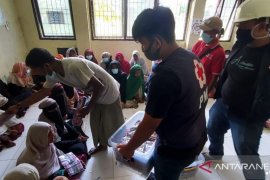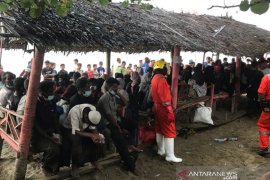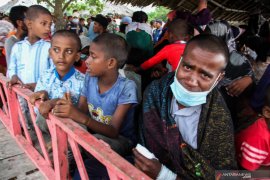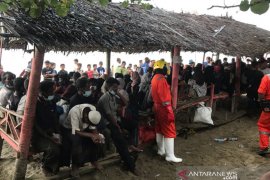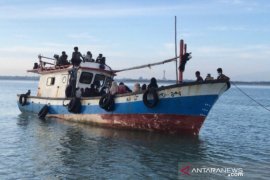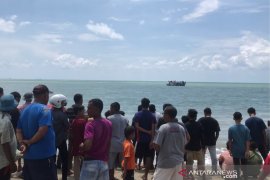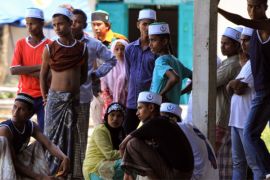The three fishermen moved the refugees, including 48 women, to another boat and pulled them near the North Aceh shore on June 24, 2020.
The local authorities, petrified of the spread of the COVID-19 disease, prevented the refugees from disembarking and pushed the boat back to sea after giving them food and drinking water.
The local villagers were moved at witnessing the plight of children and women crying for help while their boat was pushed back from Lancok Beach in Syantalira Bayu Sub-district, North Aceh District, and attempted to reason with several officers. They insisted that the refugees be allowed to disembark on Aceh land.
In the afternoon of June 25, amid extreme weather, strong winds, and dark cloudy skies, several villagers took it upon themselves to evacuate the refugees without awaiting the authorities’ approval.
“We will pull the boat back and feed them here,” Nasruddin, one of the villagers, stated.
With a strong sense of humanity and empathy, the villagers took the bold move, as there were infants, children, and old women aboard the boat.
With several NGOs and a local United Nations High Commissioner for Refugees (UNHCR) officer urging the Indonesian government to help the stranded refugees, local authorities finally partook in the evacuation of the poor Rohingya Muslims, perceived as the world's most persecuted community by the UN. They are an unwanted lot and face oppression in their hometown in Rakhine Province at the hands of their own government, the Buddhist-majority Myanmar.
Following the rescue, Oktina, a protection associate of the UNHCR, expressed her gratitude to the local residents and North Aceh government for helping the Rohingyas.
"The most important aspect is to first rescue them and give them food and drinking water, as they had been adrift at sea for months," Oktina emphasized.
The refugees claimed to have been adrift at sea for four months. They were headed to Malaysia since the husbands of several married women on the boat were already in the neighboring country. However, the Malaysian government clearly announced that it could no longer accept Rohingya refugees.
On the night of the same day (June 25), Indonesia’s military trucks were deployed to transfer them to the abandoned Blang Mangat immigration building, where Aceh’s health workers were waiting to provide face masks to the refugees and conduct COVID-19 swab tests. However, all refugees tested negative for the coronavirus.
The next day after the dramatic rescue, the faces of Rohingya children were again gleaming with smiles. Volunteers of Indonesian NGOs, particularly ACT (Swift Response Action), with assistance of the local authorities and people, were prompt in catering to the basic needs of the refugees.
ACT, whose slogan is "Care for Humanity", has also conducted trauma-healing activities for the children and arranged emergency schooling for them in the abandoned building.
A sense of humanity still prevails in Aceh, as was highlighted by numerous netizens on social media to express their gratitude to the Aceh villagers for helping the refugees.
In fact, this is not the first heroic action of Acehnese in helping Rohingya. A similar endeavor was made in May 2015 when Aceh villagers helped 1,418 Rohingyas stranded in the Indonesian waters after being adrift at sea for over three months while attempting to reach Malaysia or Australia.
The migrants, including women and 374 children, mostly without parents, were severely dehydrated and starved when rescued by the local fishermen. They had been rejected by Malaysia and Thailand.
In April 2018, Aceh fishermen again rescued over 80 Rohingyas stranded in the Aceh shore, as their boat’s engine had malfunctioned.
Aceh did not have much to offer to the refugees, as the local villagers were also leading very modest lives.
Luckily, this time, the ACT has moved swiftly in offering humanitarian assistance to the refugees and deployed trucks filled with essentials and foods from Jakarta for the refugees and local villagers.
In the meantime, Indonesian Foreign Affairs Minister Retno Marsudi recently expounded that the problem of refugee movement by sea cannot be separated from the core of the problem in their country of origin, Myanmar.
To this end, the minister called to immediately repatriate Rohingya refugees from camps in Bangladesh to Rakhine State, Myanmar.
At a virtual meeting of ASEAN ministers on June 24, the minister highlighted the need to prioritize the repatriation of Rohingya refugees from Bangladesh to Rakhine, Myanmar, and stressed that the process be conducted safely, voluntarily, and with utmost dignity.
Last year, the ASEAN Leaders had concurred on forming an ad-hoc task force to handle the repatriation plan.
Furthermore, the ASEAN Intergovernmental Commission on Human Rights (AICHR) Indonesia encouraged the Association of Nations in Southeast Asia (ASEAN) to immediately establish a special refugee protection body, as several Southeast Asian nations are oftentimes the destinations of refugees, including Rohingyas, fleeing persecution in Myanmar.
Indonesian Representative to AICHR Yuyun Wahyuningrum, in a press statement on June 25, called on the ASEAN to immediately outline protocols or ways to be applied together to ensure the safety and security of refugees.
Wahyuningrum suggested that the Government of Indonesia could lead the discussion on establishing the protocol and protection body at the summit of ASEAN countries.
"I laud the statement of the Indonesian minister of foreign affairs (Retno Marsudi) who said that Indonesia remains committed to providing assistance and taking various steps to prevent Rohingya refugees from undertaking dangerous trips in the ocean," Wahyuningrum remarked.
Despite Indonesia not yet being a member of the 1951 Refugee Convention, it has ratified the Covenant on Civil and Political Rights, which in Article 13 explicitly prohibits the expulsion of collective exclusion.
Furthermore, the rights for asylum seekers is also protected in the ASEAN Declaration of Human Rights. Moreover, Rohingyas are part of the ASEAN Community.
"Once again, the people of Aceh are demonstrating a sense of humanity, leadership qualities, generosity, and solidarity to those compelled to flee their homes to avoid persecution," she noted.
The action taken by the community in Aceh is a shining example of humanity, Amnesty International Indonesia’s Executive Director, Usman Hamid, noted in a statement.
Related news: Civil Society seeks humanitarian response in handling Rohingya crisis
Related news: AICHR Indonesia encourages ASEAN to form refugee protection agency
Editor: Rahmad Nasution
Copyright © ANTARA 2020
